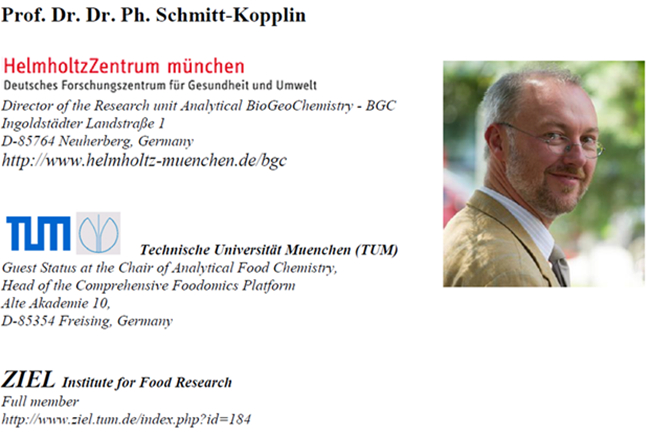Time: April 19, 2016 09:00 AM
Location: Conference Room of Basic Energy Science Building
Lecturer: Prof. Dr. Philippe Schmitt-Kopplin
Research Unit Analytical BioGeoChemistry, Helmholtz Zentrum Muenchen, Germany

Professional experiences:
· 2011 - now Director of the independent research unit "Analytical Biogeochemistry" at the Helmholtz Zentrum München, Munich, Germany
· 2009 - 2011 Director of the research unit "BioGeoChemistry and Analytics" in the Institute of Ecological Chemistry, Helmholtz Zentrum München, Munich, Germany
· 2001 - 2009 Permanent position, group leader: "BioGeomics", at the Institute of Ecological Chemistry, GSF, Munich , Germany
· 1996 - 2001 Young-scientist at the "Institut für ?kologische Chemie der GSF", Munich, Germany
· 1995 Research associate from the US-National Research Council stipend, US-Environmental Protection Agency, Athens, Georgia, USA
Education:
· Nov. 2002 Habilitation at the Wissenschaftszentrum Weihenstephan für Ern?hrung, Landnutzung und Umwelt der Technische Universit?t München in ?kologische Chemie und Umweltanalytik. Teaching actvities at TUM
· Oct. 1996 Doctor theses at the ?Institut National Polytechnique de Lorraine (INPL), Nancy , France
· Mai 1995 Doctor theses at the ?Technischen Universit?t München“, Germany ,
· 1987 - 1990 Institut National Polytechnique de Lorraine (INPL), Ecole Nationale Supérieure d′Agronomie et des Industries Alimentaires (ENSAIA), Nancy, (F)
Reviewer activities:
Various European science agencies including more specifically the frensh ANR (regular and LABEX Program) and DFG.
Peer reviewed publications:
11 review papers
269 original publications
36 Book Chapter / Book Contributions / Book Reviews
Abstract:
(Ultra)High resolving modern analytics have been confirmed as essential in the chemical/metabolic description and understanding on a molecular level of biological and environmental systems. Especially the data integration of orthogonal technologies such as direct injection (DI) ion cyclotron resonance Fourier transform mass spectrometry (FT-ICR-MS), which provides unrivalled compositional resolution, ultra-performance liquid chromatography mass spectrometry (UHPLC-MS), which increases the scope of detectable metabolites and allows the separation between isomers and NMR spectroscopy which provides detailed structural compositions has been ideally followed for the chemical diversity description in organic geochemistry and metabolomics. Powerful statistical tools and relevant databases are used in combination to the analytical platforms (FT-ICR-MS, UHPLC-MS, NMR) in order to provide an unprecedented synoptic description of the chemical complexity.
Metabolomic, as the comprehensive study of metabolic reactions in biology is growing very rapidly and integrates the knowledge of earlier developed Omics-branches. ICR-FT/MS describes highly complex mixtures on the level of the elementary composition distribution and is shown in this presentation as a dedicated tool to understand the composition and processes on a molecular level in various study fields from food chemistry, biology, organic geochemistry towards interplanetary chemistry.
We present here the analytical pipeline of DI-FT-ICR-MS for the profiling of any complex organic mixture with a focus on the possibilities in resolution and dynamic range and limits of the approach that is expended into many other metabolomics and data driven systems biology in health and environment.
Contact:DNL2003 HU Chunxiu (9396)